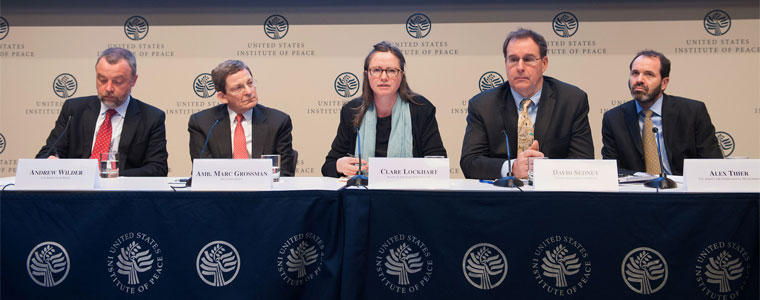Getting Beyond 2014 in Afghanistan
Read the Event CoverageThe U.S. Institute of Peace, Voice of America, and Alliance in Support of the Afghan People hosted a two panel public event that examined the U.S.-Afghan relationship, both its history and its future potential. Special Representative for Afghanistan and Pakistan Ambassador James Dobbins delivered the keynote address.

Things are not as bleak as they seem in Afghanistan, and Afghanistan's future need not be as bleak as some fear. It is true that 2014 begins with numerous uncertainties, including questions about the presidential election and a post-2014 troop presence.
But these complications obscure the reality of one of the most unusual, unexpected, but generous partnerships in American history. Over the past dozen years, tens of thousands of Americans have been engaged in the effort to stabilize and rebuild Afghanistan, a country that many had never given any thought to before the attacks against the U.S. on September 11, 2001. Since then, Americans and Afghans have interacted on a personal level, worked together as professionals, and shared their hopes for a better future for Afghanistan.
These bonds of friendship and shared hopes between Americans and Afghans will endure regardless of the political decisions made in 2014.
 "Getting Beyond 2014" was jointly organized by the United States Institute of Peace, Voice of America, and the Alliance in Support of the Afghan People. This event provided a wider perspective on the U.S.-Afghan relationship, looking back at its successes, and forward to its potential.
"Getting Beyond 2014" was jointly organized by the United States Institute of Peace, Voice of America, and the Alliance in Support of the Afghan People. This event provided a wider perspective on the U.S.-Afghan relationship, looking back at its successes, and forward to its potential.
The first panel featured key U.S. decision-makers who have played significant roles in shaping the U.S.-Afghan relationship. They discussed the optimal future of this relationship from political, security, and economic perspectives.
The second panel examined the successful media sector in Afghanistan, its importance to the country's nascent democracy and opening to the world, as well as the challenges it will face in a post-2014 environment and the level of Western support required to sustain it.
Continue the conversation on Twitter with #Post2014Afghanistan.
Agenda
9:00am to 9:15am | Featured Short Films by Voice of America
- Afghan Women: The Journey Ahead
- Afghan Sports: Excellence in Actions
9:15am to 9:25am | Welcome & Introduction
- Stephen J. Hadley
Chairman, Board of Directors, U.S. Institute of Peace
9:25am to 9:45am | Keynote Address
- Ambassador James F. Dobbins
Special Representative for Afghanistan and Pakistan, U.S. Department of State
9:45am to 11:00am | Afghanistan and the United States: The Long View
- Ambassador Marc Grossman
Former Special Representative for Afghanistan and Pakistan, U.S. Department of State - Clare Lockhart
Director and Founder, Institute for State Effectiveness - David Sedney
Former Deputy Assistant Secretary of Defense for Afghanistan, Pakistan, and Central Asia, U.S. Department of Defense - Alex Thier
Assistant to the Administrator, U.S. Agency for International Development - Andrew Wilder, Moderator
Vice President, Center for South and Central Asia, U.S. Institute of Peace
11:00am to 11:15am | Coffee Break & Photo Exhibit by Aga Khan Trust for Culture
11:15am to 12:30pm | The Future of Media in Afghanistan
(This session will be introduced by a segment from the documentary “The Network” by Eva Orner, about Tolo TV, Afghanistan)
- Peter Bergen
Director, National Security Program, New America Foundation - James Deane
Director, Policy and Learning, BBC Media Action - Danish Karokhel
Director, Pajhwok Afghan News - Najib Sharifi
Director, Afghan Journalists Safety Committee/Afghan Voices - David Ensor
Director, Voice of America
12:30pm to 12:45pm | Closing Remarks
- David Ensor
Director, Voice of America



